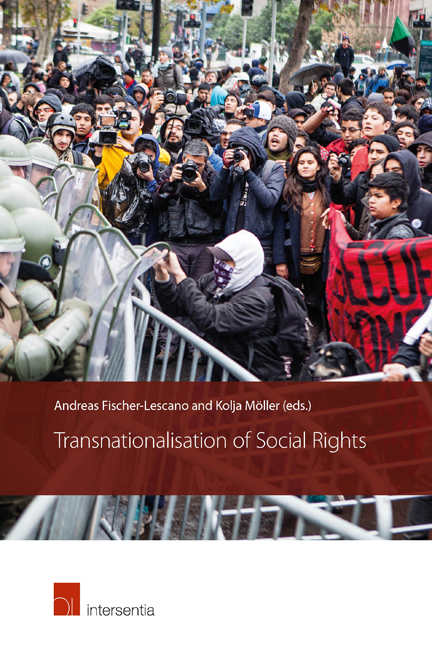Book contents
- Frontmatter
- Contents
- List of Contributors
- List of Abbreviations
- Chapter 1 Introduction
- PART I TRANSNATIONAL SOCIAL RIGHTS IN CONTEXT
- PART II FOUNDATIONS, INSTITUTIONS AND ENFORCEMENT STRUCTURES
- Chapter 5 Enforcement of Transnational Social Rights: International and National Legal Aspects
- Chapter 6 Horizontal Effects of Human Rights: The EU Proposal for a Non-Financial Reporting Framework
- Chapter 7 Labour Rights and the ILO: The Challenge of Transforming Informal Economic Activities to Promote Transnational Social Rights – Domestic and Care Work as Core Issues
- PART III ENFORCEMENT OF TRANSNATIONAL SOCIAL RIGHTS
- Index
Chapter 7 - Labour Rights and the ILO: The Challenge of Transforming Informal Economic Activities to Promote Transnational Social Rights – Domestic and Care Work as Core Issues
from PART II - FOUNDATIONS, INSTITUTIONS AND ENFORCEMENT STRUCTURES
Published online by Cambridge University Press: 12 December 2017
- Frontmatter
- Contents
- List of Contributors
- List of Abbreviations
- Chapter 1 Introduction
- PART I TRANSNATIONAL SOCIAL RIGHTS IN CONTEXT
- PART II FOUNDATIONS, INSTITUTIONS AND ENFORCEMENT STRUCTURES
- Chapter 5 Enforcement of Transnational Social Rights: International and National Legal Aspects
- Chapter 6 Horizontal Effects of Human Rights: The EU Proposal for a Non-Financial Reporting Framework
- Chapter 7 Labour Rights and the ILO: The Challenge of Transforming Informal Economic Activities to Promote Transnational Social Rights – Domestic and Care Work as Core Issues
- PART III ENFORCEMENT OF TRANSNATIONAL SOCIAL RIGHTS
- Index
Summary
INTRODUCTION
At its one hundredth session in June 2011, the International Labour Conference – the tripartite plenary (comprising government, employers’ and workers’ delegates) of the International Labour Organization (ILO) – adopted Convention 189 on Decent Work for Domestic Workers, together with the nonbinding Recommendation 201 on the same subject. Juan Somavía, the then General Director of the International Labour Office, noted with satisfaction on this occasion that:
“We are moving the standards system of the ILO into the informal economy for the first time, and this is a breakthrough of great significance. History is being made.”
Surprisingly, the Convention had already come into force in 2013 after ratification by Bolivia, Guyana, Nicaragua, Paraguay, Uruguay, Mauritius, South Africa, the Philippines, Italy and Germany – far more than the two states required for its enforcement.
It was, indeed, Juan Somavía, who came into office in 1999 as the first Non-Westerner, who had alerted the constituents of the ILO (governments’, employers’ and workers’ representatives) to the highly-vulnerable circumstances of the majority of people in the contemporary world of work. It was he who promoted the new Decent Work Agenda, an integrated programme to improve internal co-ordination between the organisation's diverse activities in standardsetting and capacity-building, and to strengthen the voice of the ILO in global governance institutions, particularly vis-à-vis the dominant international financial agencies, the World Bank and the International Monetary Fund, and the World Trade Organization (WTO). With this new emphasis, he sought to revitalise the spirit of the ILO Declaration of Philadelphia of 1944 (which today is part of the ILO Constitution) with its primacy on freedom and the principles of social justice for all; and he was able to rely on the activities and the experiences within the organisation that went back to the 1960s, when, in the wake of de-colonisation, new states were founded and became ILO Member States with socio-economic and socio-political structures that were very different from those of the early industrialised countries.
- Type
- Chapter
- Information
- Transnationalisation of Social Rights , pp. 143 - 174Publisher: IntersentiaPrint publication year: 2016
- 1
- Cited by

